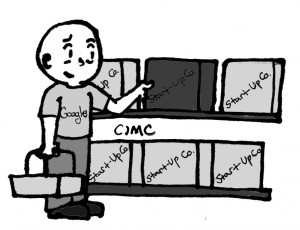The tech industry is nothing if not obsessed with big spending. Multibillion dollar purchases of startup companies and peripheral technologies have abounded over the last few years, making headlines with their stories of eccentric CEOs and explosive industries, all in the skeptical tone of a non-geek reporter silently questioning how any company selling text messages or a TV screen for your face could possibly be worth that much money.
The recent investments in “moonshot” ventures such as SpaceX by Google and the so- called “Hyperloop” superspeed rail system by Elon Musk have attracted similar news interest, along with all the expected arguments over feasibility, value and the mental stability of these enthusiastic leaders of industry.
“Invest” is a funny word in this case because nobody’s really sure whether these purchases will ever make a profit, much less a return. Is buying into asteroid mining or a railway powered by compressed air a purchase or a charity? Or both?
When debating whether the multibillion value of a company like Oculus or WhatsApp is inflated or not, you can at least point out these companies do, in fact, make money and have the potential to make a lot more very soon.
But the Hyperloop doesn’t make money, adhered as it is to a pile of engineering concept papers and crumpled calculations. It may not make
money this year, or this decade. So when the major players start dumping millions of dollars, it’s easy to question where the motivation comes from. For companies that rely on trust, loyalty and enthusiasm to make their quarterly profits, “moonshot” projects form a kind of advertising, drawing in the geeks as they flock to the press and excitement that builds around space travel and exotic transportation. And for a company like Tesla, which sells more cars off of enthusiasm for the concept of electric vehicles than their everyday practicality, this kind of excitement is critical. A few million in the hole for a public infrastructure project that may never pan out is a drop in the bucket for a large car company, but the benefits of a generation growing up trusting the “geek cred” of a brand and a corresponding enthusiasm for their products are endless.
It’s an enthusiasm that’s lead to Tesla’s current 24 billion dollar market capitalization, a numbero optimistic about the company’s future even Musk himself admits it’s a “bit unrealistic”.
But for many moonshots, the real question is whether they can “fail” at all.
Google Glass–which has recently retired its beta program and seems destined to move into obscurity–never had a tremendous amount of industry potential, but
it certainly got a lot of press. And for a company like Google, which relies entirely on the trust of its users to infiltrate and monetize their entire online lives, press is everything.
Glass may not have become a best-selling product, but it was a best-selling concept, and it reinforced Google’s all-important image as a reassuring and unthreatening crowd of engineers excited about the future. It’s an image competitors like Facebook and Microsoft perpetually labeled as massive and intrusive shadow bureaucracies have never been able to emulate, while Google happily mines your personal data for advertising without consequence.
All this being said, having a tech world that revolves around huge, expensive pet projects could be a lot worse. Concepts so wild that baffle even experienced researchers in the field can seem obnoxious for all the attention they get from a sensationalized press, but some moonshots may come to have a successful future despite humble beginnings.
SpaceX is rapidly proving that private spaceflight may be a commercially viable venue for facilitating satellites and research, and the Google self-driving car may have more of a future in automated transport than anyone could have imagined from its origins almost a decade ago.
Moonshot investments may not be as playful or risky as they are purported to be, but the results still take us one step closer to a brighter future.
Copeland is a member of
the class of 2015.



